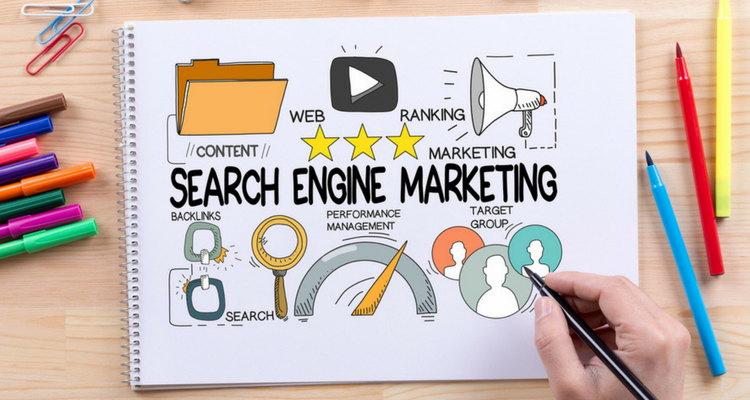SEO is a very important aspect of business these days, and it all starts with your company website. Your website might be the first impression a customer gets of your business, so you need to make it count. There are certain details that can enhance your website in the realm of Search Engine Optimisation.
1. Make Your Website Mobile-Friendly
This may be the most important thing to remember about your company’s website. Design the website so that it is optimized for viewing on a mobile browser. More website traffic actually comes from smartphones and tablets now, rather than traditional desktops and laptop computers. If your website isn’t easy to navigate on a smartphone or tablet, visitors won’t waste their time trying to navigate it. They’ll move on to another website.
2. Speed Is Everything
If your website loads too slowly, internet users will give up and go elsewhere. Websites that load quickly rank better in search results, get more page visits, and get more conversions. Speed improves the user experience, and there are a few things you can do to make sure your website is operating at top speed.
- Remove any plug-ins that aren’t absolutely necessary. Plug-ins take time to load, which slows the page down.
- Optimize the size of images on your pages. The smaller the image is, the faster the page will load.
- Use a caching service, to allow frequently accessed pages to be loaded more quickly.
- For WordPress websites use hints from Google Page Speed tool to install the relevant plugins and tools to optimise your website.
There are other tools that give you more comprehensive graphs and charts such as Pingdom tools to help you understand what is slowing down your website
3. Designing Your Site
There are an endless number of techniques you can use to make your website easy to navigate and user-friendly. Your website needs to be designed for conversion if you’d like to sell on the website or generate leads.
4. Permanent Link Structure
- The permanent link Structure describes the format of URLs for pages of a website.
- Make URLs as simple as possible, and use hyphens to separate the words in URLs. For example, use www.abcwebsite.com/about-us.
- Make sure the URL includes main keywords that you are targeting for that page. Having an optimized URL helps users to understand what the page is about, increase the CTR and help the search engines to rank the page for the keywords.
5. Internal Links
- Internal links are the links in a page that direct the user to other pages within the website.
- They should be both useful for the visitor and easily understood by search engines.
- You should not use many internal links on each page, and never use phrases such as “click here” for those links. Rule of thumb is to keep all internal and external links on a page below 100. This includes all header and footer links.
- Do not keyword-stuff the anchor texts of the internal links. Internal linking is mainly for purpose of inter-connection of the website pages.
- Breadcrumbs are a particular set of internal links to aid in navigation of the website. They’re most often found at the top of a page.
- You can also use internal links to link related articles together. The same applies to suggesting similar products to viewers.
- It’s also a good idea to occasionally go back to older posts and link to the newer posts, to give the visitor the most current information.
6. Page Descriptions and Titles
- Each page needs a different, unique title that should tell what the page is about. It should be simple, but descriptive.
- The page description’s Meta tag is very important when it comes to search engines. You need unique descriptions for pages, products, and posts on your website. You should avoid repeating the page title in the descriptions, and don’t use too many keywords. For every page, include the main three keywords in the title tag.
7. Text Options
- Use an easy-to-read font size for the text on your website. Break the text up into small paragraphs to hold the reader’s attention, and feel free to use bold print and italics when needed.
- We recommend using H1 tag for the titles of postings, with H2 tags for the main headings within the post, but don’t use H2 tags for all of the headings. Only use one H1 tags and it is best to include the main keyword in the H1 tag.
8. Sitemap for Users
- The user sitemap is a list of all the pages and posts on your website, and is literally a map for the website visitors.
- You should include a link to the user sitemap in the main menu. You’ll need a XML sitemap for search engines, while you’ll want a HTML sitemap to help visitors find your content.
9. Check External Links Regularly
- Make sure your website doesn’t have any broken links that lead nowhere, and don’t ever link to sites that are inappropriate.
- Don’t sell or exchange links. These will only damage your business credibility. Start with local directories and listing websites. There are few basic things to check before getting links from a website. Use Majestic Extension to check the metrics of the site, check if the site is still indexed in Google and in fact it is not penalized by Google.
10. Make the 404 Page Design Less Disappointing
- The 404 page displays when the user looks for a page on your website that doesn’t exist, mistypes a URL, or follows a broken link.
- The default design is a very boring “Page Not Found” message, but you should give the user some idea of what happened. This can be a short phrase, such as “Oops! We messed up!” The design of the 404 page should be consistent with the rest of your website, and it’s always good to give the user an option to navigate to other parts of the website.
11. Content Is King
We’ve all heard it, and the phrase “Content is king,” is still true. You have to provide quality content that is useful to your website visitors. Be consistent with formatting the text throughout your site, and avoid making grammatical mistakes or typos. It helps your credibility to include references for any specific details, and creating content that is shareable can lead to more website traffic, and readers share your information.
More and more websites are having success with video and multimedia, and many users actually prefer video content over text, so it’s a good idea to put at least some of your content in the form of videos. Using photos in a website issep mandatory. Use smaller, clear images to avoid bogging down your website, and use some keywords, but not too many. For easy access, keep all images in a dedicated photo file within your website, and use keywords to name the image files.
SEO can be intimidating to a newcomer, but it doesn’t have to be. Integrating SEO into your website design from the very start will make the process much easier, and improves the chances of success for your business.
Sam Cyrus
Latest posts by Sam Cyrus (see all)
- 11 SEO Tips for Beginners to Boost Website Traffic - October 27, 2016








